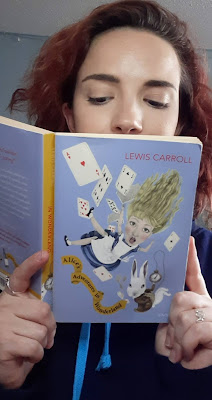The brilliance of Lewis Carroll
Lewis Carroll has always been a writer who I go back to in order to escape the real world and because of his vivid imagination, he is someone I aspire to be like.
One of my favourite books is Alice in Wonderland but it's not until recently that I learned that Lewis Carroll and I have something in common; we both stutter. I find Lewis Carroll's life story so intriguing, who is the man behind my favourite book? What was his relationship with his own stutter? And how did his stutter affect his work?
A little bit about the author;
One thing that intrigues me about Lewis Carroll is that he didn’t use his own name for his work. Carroll was born Charles Lutwidge Dodgson in the year 1832, in Chesire, England. (Could the reason be that he struggled to say his own name, therefore he changed it to something he could say?) He was the eldest son of eleven siblings; most of whom stuttered. Carroll's father was a Church of England cleric, which I believe is significant because Carroll’s stutter; ‘Upon one occasion he accepted the invitation to preach and recalled, "I got through it all with great success, till I came to read out the first verse where the two words ‘strife, strengthened’ coming together were too much for me, and I had to leave the verse unfinished.” Carroll's stutter, seemed to prevent him from doing the things he wanted to do, such as performing his clerical duties and even pursuing a career in teaching, which he eventually did achieve. He did, however, demonstrate a tremendous writing talent, which is why he is so well-known today.
Isolation and Intelligence;
As almost every person who stutters has
experienced; Carroll went through bouts of isolation because of his stutter,
which he called his 'hesitation'. It's important to remember that back in
Carroll's day, stuttering wasn't addressed nearly as much as it is now, and
because Carroll focused on fluency rather than learning to accept his speech, he
tended to carry a great deal of shame. As a result, he struggled with feelings
of isolation, which inevitably affected his self-esteem and confidence.
However, as a person who stutters, Carroll used his
stutter to his advantage in relation to language; ‘Most probably Carroll used the phenomenon of stuttering…as a literary device, as a kind of positive contribution to the language in reaction to the negative influence of the stuttering on his personality.’ I believe this means two things: Carroll had a large vocabulary range
due to his stutter; and, in my opinion, Carroll presumably switched his words
around a lot to avoid stuttering, resulting in him learning more words than he
needed to know. Another fascinating aspect of Carroll's stutter and language is
that he used nonsense language, which essentially subverts language conventions
or logical reasoning into a comprehensible language form. The reason for this,
I believe, is that separating words from their meanings implies that words and
phrases are empty, so why should it matter how the words are said if they have
no meaning?
Alice in Wonderland (1865)
One character that Carroll created in order to symbolise his struggle
with his stutter is The Dodo from Alice in Wonderland. It is
noted that the character of The Dodo came from Carroll’s inability
to pronounce his real name of Charles Dodgson and frequently being forced to
pronounce his surname “do-do-Dodgson.”
There are other references to Carroll’s stutter which feature in Alice
in Wonderland, including the following statement from the Red Queen to
Alice; ‘It's time for you to answer now,' the Queen said, looking
at her watch, 'Open your mouth a little wider when you speak...’ ‘Look up,
speak nicely, and don't twiddle your fingers’ ‘Think before you speak.
Write it down afterward!’ This passage contains similar ideas to those commonly
associated with people who stutter, such as ‘Take your time' or ‘Breathe.'
What Lewis Carroll has taught me;
This can be summarised in one statement; he taught me that I didn’t have
to make sense of the world, nor the world make sense of me in order to be
accepted. Alice in Wonderland is essentially about a child’s
struggle to survive in the adult world but in relation to stuttering, this
novel has elements of Carroll’s struggle to survive in a world of fluency.
 |
| A poem that Lewis Carroll wrote which describes his feelings about his stutter |



Comments
Post a Comment